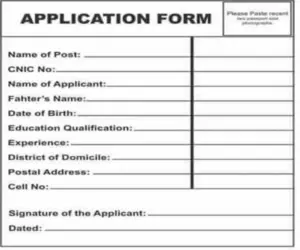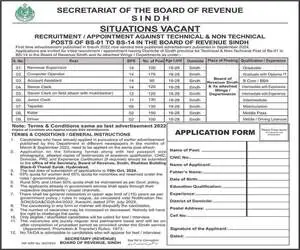The Board of Revenue Sindh has announced the latest vacancies advertised on Daily and Dance on 12th October 2024. You can visit our website if you want to apply for Up Board Free Value SIM. Full information about them will be given in the Board of Revenue both men and women can apply for the vacancies.
Candidates interested in the Board of Revenue Sindh will have to provide the necessary documents Certificates Experience Certificate Eligibility CNIC Copy Detailed CV with recent passport-size photographs Only shortlisted candidates will be called for an interview.
Before applying for Board of Sindh jobs, read this job information carefully and then apply otherwise your application form may be rejected. On our website, you will be given full information about this job If you have any queries or questions, you can ask us about it.
Detail Of Jobs In The Board Of Revenue Sindh 2024
| Post Date | 12-10-2024 |
| Industry | Government |
| Jobs Location | Karachi Pakistan |
| Hiring Organization | The Board Of Revenue Sindh 2024 |
| Last Date | 25-10-2024 |
| Education Require | Matric | Intermediate | Graduate |
| No of Posts | 30+ |
| Employment Type | Full Time |
| News Papers | DAWN newspaper |
| Address | The Board Of Revenue Sindh 2024 Pakistan |
Eligibility Criteria For Jobs In The Board Of Revenue Sindh 2024
| Education Required | Materic | Intermediate | Graduation |
| Age | 18 to 28 Years |
| Gender | Male/Female |
| Province/District | Karachi Pakistan |
| Experience | 1 and 2 years |
Posts Available In Jobs In The Board Of Revenue Sindh 2024
- Revenue Supervisor
- Computer Operator
- Account Assistant
- Senior Clerk
- Junior Clerk
- Tapedar
- Kotar
- Driver
How to Apply For Jobs In The Board Of Revenue Sindh 2024
- To apply for the jobs at The Board Of Revenue Sindh, you must have the required experience in the relevant field.
- If you are interested then you must look at the advertisement carefully, as you know that if you are eligible then you will be shortlisted otherwise you will be rejected.
- Qualification is mandatory because related to the post your qualification must match the requirements.
- Candidates who have already applied in the advertisement published by this department in different newspapers in March and September 2022 need to apply on the same post-refresh.
- application in the following format along with two passport-size photographs attested copies of documents and academic qualifications domicile PRC and experience certificate are required should be submitted to the office of the Secretary Board of Revenues and Shahbaz building Block D 20 Sadak Hyderabad.
- 5% quota for women and a five percent quota for minorities are reserved under the government policy.
- Ruler 50% in urban 50% quota shall be maintained is a government policy.
- There is no online way to apply for these posts kindly apply by the courier service address mentioned above.
- Check the application form given in the advertisement below
Application Form of Board Of Revenue Sindh Jobs

Advertisement Of Jobs In The Board Of Revenue Sindh 2024

About The Board Of Revenue Sindh
The Board of Revenue Sindh (BOR Sindh) is a key department within the provincial government of Sindh, Pakistan. Its primary functions revolve around the administration of land, revenue collection, and maintenance of land records in the province. BOR Sindh is responsible for enforcing the policies related to land revenue, taxes, and land reforms, ensuring that the provincial government’s financial resources are properly managed and that land-related legal frameworks are adhered to.
Key Functions of the Board of Revenue Sindh
- Land Revenue Administration: The Board of Revenue Sindh is responsible for assessing and collecting land revenue, agricultural taxes, and other levies related to land use. This involves maintaining accurate land records, determining land classifications, and ensuring that property owners and landholders are paying their dues in accordance with the laws of the province.
- Land Records Management (Computerization of Land Records): One of the key responsibilities of the BOR Sindh is the maintenance and computerization of land records. This initiative aims to create a transparent, accessible, and efficient system for landholders to obtain their records, thus minimizing the chances of fraud or manipulation. Through digital land records, the department ensures accurate tracking of ownership and prevents disputes over land boundaries or titles.
- Land Settlement and Acquisition: The BOR plays a pivotal role in land acquisition, whether for development projects, public use, or government schemes. It ensures that the acquisition process follows the laws of Sindh and that compensation is provided to landowners in a just and timely manner. The board also handles disputes related to land settlement.
- Land Reforms and Revenue Laws: BOR Sindh oversees the enforcement of land reforms and revenue laws in the province. These laws include provisions for land distribution, tenancy rights, and the proper use of agricultural and non-agricultural land. The board also advises the government on potential reforms needed to improve land administration.
- Judicial Functions: The Board of Revenue Sindh acts as a quasi-judicial body in land disputes. It has powers similar to a court in matters of land revenue, disputes over land ownership, inheritance, tenancy, and other land-related issues. Appeals regarding land matters are often addressed at the BOR Sindh before proceeding to higher courts.
- Issuance of Land Titles and Documents: BOR Sindh is responsible for issuing land ownership documents such as Fard Malkiat (ownership certificate) and Mutation (intiqal) certificates. These documents are vital for land transactions like sales, inheritance, and transfers.
- Survey and Mapping: The Board oversees surveys and mapping of land across Sindh. Accurate maps and land surveys are necessary for planning infrastructure, development projects, and land settlements. The Survey of Pakistan works closely with BOR to ensure maps and records are kept up to date.
- Disaster Management (Relief and Rehabilitation): The Board of Revenue Sindh also performs an essential role in disaster management. It coordinates relief efforts during natural disasters like floods, earthquakes, and droughts in Sindh. The board oversees the distribution of resources, compensation for affected people, and rehabilitation programs post-disaster.
- Coordination with Other Government Departments: BOR Sindh coordinates with various provincial and national-level government departments for policy implementation, particularly those related to taxation, land management, and revenue collection.
Organizational Structure of BOR Sindh
The Board of Revenue Sindh operates under the leadership of the Senior Member Board of Revenue (SMBR), who is typically a senior bureaucrat. The SMBR reports directly to the Chief Minister of Sindh and the provincial cabinet on matters of revenue and land administration.
Some key officials and departments within the BOR Sindh include:
- Member (Land Utilization): This official oversees the distribution and utilization of government-owned land.
- Member (Taxes): This office is responsible for overseeing land revenue and tax collection.
- Commissioner Land Records & Settlement: Manages the land records and settlement operations.
- Deputy Commissioners and Assistant Commissioners: These officials work at the district level, handling revenue collection and land administration in their respective districts.
Each district in Sindh has its own Revenue Department, headed by the Deputy Commissioner, who functions under the guidance of BOR Sindh. At the taluka or tehsil level, Assistant Commissioners perform the same functions, while Mukhtiarkars are responsible for revenue collection and land record maintenance at the local level.
Major Initiatives
- Land Record Management Information System (LRMIS): BOR Sindh has been working on the computerization of land records under the LRMIS project, aiming to modernize the existing manual system. This system helps reduce land-related disputes and provides an efficient process for obtaining land records.
- Sindh Revenue Act, 1967: This is one of the key laws that guide the activities of the Board. It provides the legal framework for land revenue administration, land ownership, and taxes in Sindh. The BOR Sindh ensures its proper implementation.
Challenges Faced by BOR Sindh
Despite its crucial role, the Board of Revenue Sindh faces several challenges:
- Corruption and Malpractices: There have been accusations of corruption, including manipulation of land records, bribery, and favoritism in land allocation and taxation processes.
- Lack of Modernization: While digitization efforts are underway, the process has been slow, and many areas still rely on outdated, manual systems, leading to inefficiencies and opportunities for fraud.
- Land Disputes: Due to incomplete or inaccurate land records, disputes over land ownership are common, which often burden the courts and delay developmental projects.
- Capacity Constraints: The Board sometimes lacks the resources and manpower to effectively manage the increasing demands of a growing population and urban expansion.

